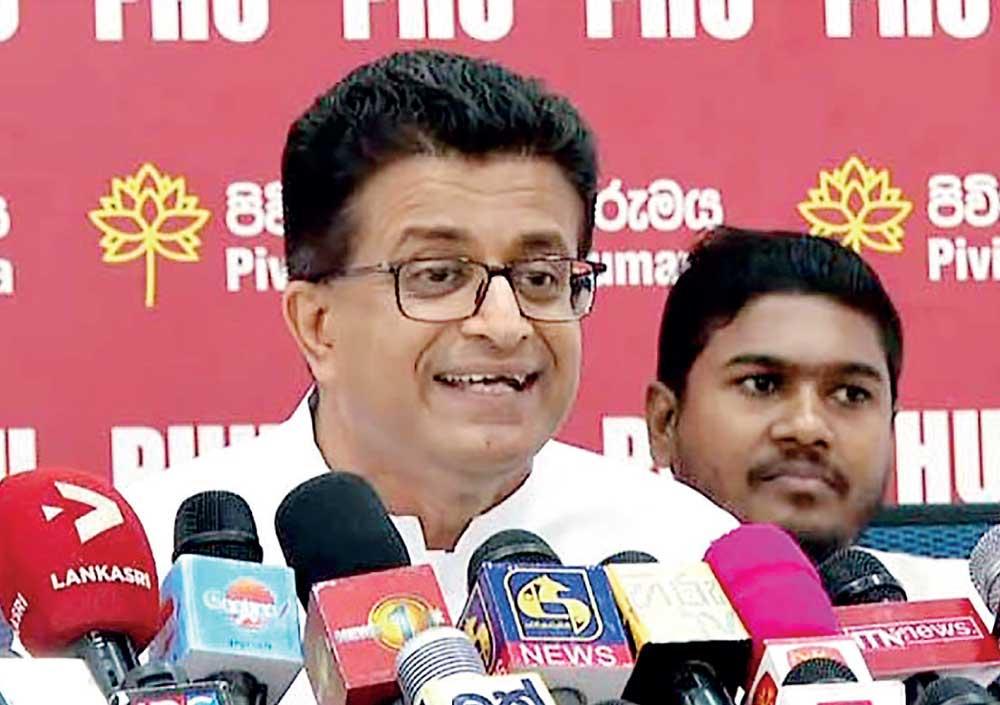23 Oct 2024 - {{hitsCtrl.values.hits}}

 “Secrecy, being an instrument of conspiracy, ought never to be the system of regular government.” Jeremy Bentham-English Philosopher, Jurist:1839
“Secrecy, being an instrument of conspiracy, ought never to be the system of regular government.” Jeremy Bentham-English Philosopher, Jurist:1839
Julian Assange’s WikiLeaks exposed confidential documents in 2010, sparking unprecedented controversy and leading to intense scrutiny of American involvement in foreign conflicts. In Sri Lanka, certain opposition politicians, particularly those associated with previous administrations responsible for the country’s earlier political and economic mismanagement, have begun a relentless mud-slinging campaign against the newly elected President and his small cabinet. As the deadline for the exposure approached its final 24 hours, the President, addressing a well-attended election rally, spoke about looming threats and attempts to discredit his government.
Gammanpila, after much speculation and curiosity, with whispers about the possible exposure of sensitive information related to the 2019 Easter Sunday attacks, has implicated not only the new administration but also the previous government. The government does not “hide facts”; they are simply not obliged to divulge all information immediately. The most guileless reason is that revelation could compromise national security or risk lives. The million-dollar question arising from his revelation is why both Ranil Wickremesinghe’s and Anura Kumara’s governments hesitated to publish the reports. The second case is clear: the commission’s findings have caused serious embarrassment. Appointments to two vital positions in Law and Order, including the highest in the hierarchy, reportedly went to questionable individuals if the findings are accurate.
The law requires the government to disclose information to the public upon request unless such information falls within one of nine narrow exemptions.
He has opened only one-half of the “Pandora’s Box,” which, according to Udaya, requires more time for debate on the issues it contains. He announced a break before airing the final episode of the “Easter Papers” next Monday. Contrary to public expectations, what was revealed on Monday failed to expose the so-called ‘Master Brain’ or behind-the-scenes machinations and cover-ups. Instead, it focused on drastic lapses by the intelligence and CID, directly accusing the current Ministry Secretary, Ravi Seneviratne, and Shani Abeysekara—both of whom, as retired men, appeared on the JVP/NPP stage during the campaign. As Gammanpila contests the upcoming parliamentary elections, there are suggestions that he may use this as a card to draw attention to his campaign or apply political pressure.
Whether he has truly exposed the “Easter Papers” remains unclear, as such a move would have far-reaching consequences, not just for those implicated, but for the broader political establishment. However, his reputation for theatrics and political manoeuvring suggests that this could also be a calculated attempt to gain public interest or is this yet another strategy to keep himself in the spotlight during a crucial election season?
Udaya and Champika, both of whom rose to prominence by championing a chauvinist agenda, along with Wimal Weerawansa, are now fading into political obscurity. Their past reliance on language-based, ultra-nationalist, and racist slogans to stir emotional fervour has proven ineffective in the face of changing public sentiment. The electorate’s rejection of these divisive tactics reflects a broader shift toward more inclusive and pragmatic politics, where issues like economic development, social justice, and good governance take precedence over racial or ethnic divisions.
The SJB and the rest having been relegated to the opposition—the only arena where they seem to have secured a permanent place due to their failures—are now attacking the new leadership over trivial or exaggerated issues. Their attempts to criticize often appear more like a desperate bid to stay relevant in the political sphere, rather than offering genuine solutions or meaningful critiques. This ongoing behaviour underscores their inability to move beyond past mistakes, choosing instead to undermine the efforts of the new administration without constructive engagement.
Their criticism often lacks substance and not offering constructive alternatives or solutions. This behaviour highlights the ongoing polarization in Sri Lanka’s political landscape, where genuine debate often takes a backseat to personal attacks and partisan rivalries.
Vijitha and Udaya
Meanwhile, Udaya’s former colleague, Champika Ranawaka, has opted for a well-deserved break from politics—a hiatus that could signal a permanent farewell after numerous setbacks. At 60, Ranawaka’s attempts to rejuvenate his political career through movements like the “43rd Brigade” and “Republican...” failed to gain traction. After a series of unsuccessful bids for the common candidate slot, he cut a sorry figure, unable to secure even a consolation parliamentary seat from either the JVP or the UNP. Consequently, Ranawaka found himself back in the Premadasa camp, underscoring his diminishing influence in Sri Lanka’s political arena. His retreat may mark the end of an era characterized by missteps and missed opportunities. Their once-dominant influence is waning. Their inability to evolve and meet the expectations of a more enlightened, forward-thinking voter base has left them behind in Sri Lanka’s shifting political landscape. While they had once thrived on nationalist and chauvinist rhetoric, today’s electorate demands more pragmatic leadership focused on real issues.
They frequently quote the rhetoric and slogans used by the NPP/JVP alliance during the election campaign, employing a common propaganda tactic seen throughout Sri Lanka’s electoral history. These empty promises, reminiscent of slogans like SLFP’s “handen haal” (rice from the moon-1970) -- UNP’s “eta ata” (eight pounds of grain free-1977), and JVP’s “Rajapaksahoraa kaapu salli” [$18 Billion back from Uganda-2024], are typical of the exaggerated claims made by political parties to win over voters.
Magician, … & the ‘Rabbit’
Has Udaya pulled a dead rabbit out of his hat? The public is eagerly wondering whether he can leverage the potential exposure of sensitive documents, particularly those that former President Ranil Wickremesinghe has allegedly kept under wraps for a couple of months. The secrets contained in the other report may reveal critical information regarding the 2019 Easter Sunday attacks, including possible lapses in security and decision-making that could have led to the tragedy.
The government has already entrusted the investigations of the Easter attacks to the two high-ranking controversial former cops. Can they win the confidence of the people?
Moreover, the manner in which Gammanpila acquired these documents, which were reportedly kept in safe custody at the Presidential Secretariat, poses even more intriguing questions. How did he manage to gain access to such sensitive material, and what implications might this have for both his political ambitions and the broader political landscape? These billion-dollar questions reflect the public’s desire for clarity and accountability, as citizens seek answers to the mysteries surrounding the Easter Papers and their implications for justice and governance in Sri Lanka.
‘Even if it can be established that disclosing the information would cause substantial harm to a genuine interest, the information should still be divulged if the benefits of disclosure outweigh the potential harm’--Principles on Right to Information
22 Dec 2024 1 hours ago
22 Dec 2024 1 hours ago
22 Dec 2024 4 hours ago
22 Dec 2024 4 hours ago
21 Dec 2024 21 Dec 2024